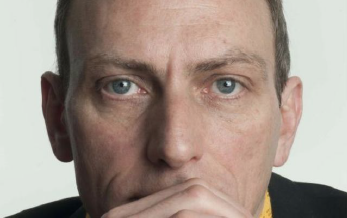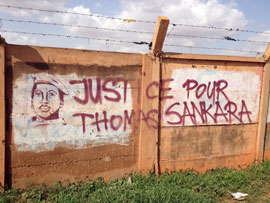| |
DIRECTOR
Bio-filmography • Interview

Interview with Christophe Cupelin, director
By Pascal Knoerr
How did you become interested in Burkina Faso and Thomas Sankara ?
I travelled to Burkina Faso for the first time in 1985. The discovery of the Burkina Faso revolution was a shock and a revelation for the young 19-year-old I was then. For all the people of my generation, whether African or not, who knew of Thomas Sankara, he embodied the hope not only for a better society in Burkina Faso but also for a better world for all. This innovative president spoke of very serious matters with inspiration and humor, especially on the national Burkina radio, and he left an indelible trace in my memory.
More precisely, what made Sankara such an atypical Chief of State ?
Thomas Sankara's reputation went far beyond the boundaries of his country and of the African continent. He was considered as the president of the poor, the spokesman for the forgotten. Even in his own camp, he was considered as an anti-conformist revolutionary. Because of his honesty, his integrity and his charisma, it was Sankara who « dared to invent future », according to his own words.
He belonged to the new generation which appeared in Africa in the 80's, young revolutionary members of the army in love with integrity and freedom. « Without political education, a soldier is only a potential criminal » Sankara declared, thereby showing his difference. His declarations made the people in power tremble and worried governments in both the North and the South. His tragic death contributed to making him an mythical figure in contemporary African history, adored by young Africans.
Today, most of the people of Burkina keep the memory of an honest man who changed the mentalities of his fellow citizens and gave dignity to his country. An image and an ideal that resists time, Thomas Sankara is still considered as the father-founder of the nation.
Why did you choose cinema to tell his story ?
I made my first Super 8 images during my first trip to Burkina Faso, and that is when I decided that I « wanted to make movies ». Today, half a century later, this film takes me back to those beginnings, to the hopes that we carried then, to a time when history seemed to be happening live…
As far as the raw material is concerned, I was privileged to use archives that reappeared in 2007 on the twentieth birthday of Sankara's death. Until then, all audio-visual traces of Sankara and the Burkina Faso revolution had disappeared or had been made invisible.
That year, important archives released from copyright appeared on the Internet. Two films made for television, each containing unreleased images, were produced in France and I also found other « new » archives.
How did you organize the story of your film around these archives ?
These images are very important for history and allow us to discover Thomas Sankara at work, his charisma and his importance for Africa. When he attempts to convince us of the truth of his revolution, his personality, eloquence, intelligence and humor light up the screen. We can also see how he was perceived by the Western media – especially in France – during the 80's. He was sometimes considered a Marxist, or a Khadafi puppet, as being anti-French or even as a dictator…
These various archives, finally public and accessible, along with my own personal archives collected in Burkina Faso during my first 1985trip enabled me to tell a strong, fascinating and more in-depth story of Thomas Sankara and the Burkina Faso revolution. The narrative construction is based on my own experience there, on all the written and unwritten sources available now, on the collection of oral memory transmitted by the different people who knew Sankara closely or from a distance.
Your film also deals with the mystery around Thomas Sankara's death…
There was never an inquiry about the circumstances of Sankara's death. His official death certificate was produced three months after his death and only mentions that he died of « natural death ». His presumed grave is in the town cemetery of Dagnoen on the western outskirts of Ouagadougou, where a yearly memorial service is held every 15 October.
The main suspect in Thomas Sankara's assassination is his best friend, Blaise Compaoré. « Number two » during the 1983 to 1987 revolutionary period, Compaoré is still president of Burkina Faso today. This brutal human tragedy between « brothers in arms » helps give a mythological dimension to this story.
You can kill a man, but you cannot kill his ideas. This saying perfectly suits the person of Thomas Sankara, who had left us with the heritage of a new and singular political and social experience. To a certain extent, Sankara is more present dead than alive. Now is the time to restitute his memory and his words to the Burkina Faso people and to the international community.
Pascal Knoerr, June 2012
|
|
| |
|
|
THOMAS SANKARA & NEWS :

---------------------------------------------------
• Burkinabe ex-President Compaore charged in Thomas Sankara murder
aljazeera.com, April 13 2021
---------------------------------------------------
• Thomas Sankara : Man of Integrityafrika-news.com, Ynug Anabel, April 26, 2017
---------------------------------------------------
• Burkina Faso Begins Exhumation Of Thomas Sankara's Grave Nearly 30 Years After His Death
tbtimes.com, Aditya Tejas, May 26 2015
---------------------------------------------------
• Thomas Sankara remains: Burkina Faso begins exhumation
bbc.com, 25 May 2015
---------------------------------------------------
• "We want the truth!" Burkina Faso exhumes graves marked for ex-leader Sankara, his followers
usnews.com, BRAHIMA OUEDRAOGO, Associated Press May 25, 2015
---------------------------------------------------
• Burkina Faso opens graves to answer questions about Thomas Sankara
theguardian.com, Associated Press, 25 May 2015
---------------------------------------------------
• "Burkina Faso's revolutionary hero Thomas Sankara to be exhumed"
theguardian, 6 March 2015
---------------------------------------------------
• "Citizens' Revolt in Burkina Faso"
african-futures, Ernest Harsch, December 9, 2014
---------------------------------------------------
• "Burkina Faso profile"
BBC.com, 2 November 2014
---------------------------------------------------
• "Power struggle in Burkina Faso after Blaise Compaoré resigns as president"
The Guardian, David Smith, 1 November 2014
---------------------------------------------------
• Burying Africa's hopes: remembering Thomas Sankara, the revolution and how Blaise Compaoré stole it all
Joan Baxter, November 1, 2014
---------------------------------------------------
• "Burkina army imposes interim government after crowd burns parliament"
Reuters.com, Mathieu Bonkoungou & Joe Penney, 30 October 2014
---------------------------------------------------
• "Burkina Faso: A Thousand Sankaras Come of Age"
thinkafricapress.com, Brian Peterson, 15 August 2014
---------------------------------------------------
• "Thomas Sankara"
Britannica.com, Carina Ray, 12 December 2013
---------------------------------------------------
• "Thomas Sankara And The Assassination of Africa's Memory"
saharareporters.com, Chika Ezeanya, 15 October 2013
---------------------------------------------------
• "Who killed Thomas Sankara?"
africasacountry.com, Shamira Muhammad, 14 March 2013
---------------------------------------------------
• "25 Years On: The Mixed Legacy of Burkina Faso's Thomas Sankara, Socialist Soldier"
thinkafricapress.com, Peter Dörrie, 15 October 2012
---------------------------------------------------
• "Sankara's Tomb Vandalised In Burkina Faso Capital"
AFP, 29 July 2011
---------------------------------------------------
|

